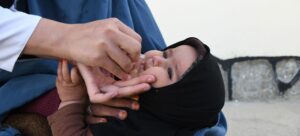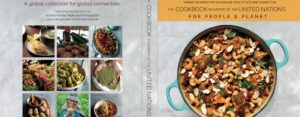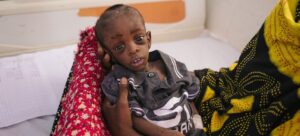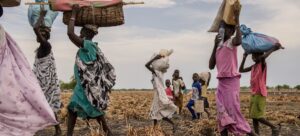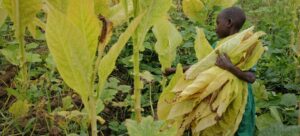Crab cakes made with fonio, an ancient West African grain, or Ratatouille prepared with ‘imperfect’ produce to reduce food waste, are only a couple of the over 70 recipes included in the recently launched Cookbook in Support of the United Nations: For People and Planet.
The book – created in collaboration with the UN Food and Agriculture Organization (FAO) in consultation with other UN entities such as UNESCO, the UN Environment Programme (UNEP), UN Climate Change (UNFCCC) and the UN Department of Global Communications – is the brainchild of Kitchen Connection, an organization that for a decade has been bridging together culinary arts, sustainability and education, and driving the discussions on the need for a food systems transformation.
“Understanding that cookbook consumption is on the rise and that people are using them as a source for education and inspiration, the idea for one had always been on our table,” Kitchen Connection founder and New York University Professor Earlene Cruz, explains to UN News.
World Food Programme Goodwill Ambassador Chef Manal Al Alem, and Kitchen Connection’s founder Earlene Cruz, hold the Cookbook in support of the United Nations.
But how is this cookbook different?
For People and Planet is divided into chapters that include food systems, biodiversity, sustainable consumption and production, climate, as well as food waste, providing recipes, yes, but also insights into the carbon footprint of each dish.
“We found that those in the highest-emitting countries in the world emit through our food choices about 3 kilograms of CO2 emissions per meal. The recipes in this book have 58.6 per cent less carbon compared to an average meal from high-emitting regions of the world. This book is dedicated to the planet,” Ms. Cruz says.
The cookbook also highlights and follows the UN World Health Organization’s (WHO) macronutrient guidelines, making the recipes not only healthy for the planet, but also for us.
But most of all, it puts a spotlight on how important our food choices are and how can they impact our immediate environment, no matter where we cook.
Lionfish and Carambola Cashews, one of the recipes included in the Cookbook in Support of the United Nations.
The climate cost of our food choices
Describing a quiche recipe shared by Lisa Johnson, a chef for NASA scientists in Antarctica, Ms. Cruz says: “This recipe contains [chicken] eggs, and in Antarctica, [chickens cannot] interact in any way with penguins, so chef Lisa had to cook that part of the recipe in a completely separate facility. This shows the challenges of cooking in remote areas.”
“The point is that whether we’re in cities, in suburban or rural areas, or somewhere as remote as Antarctica, consideration of our food choices and how they impact our immediate environment is paramount,” she adds.
The book features 75 recipes along with instructions for preparation but also reflections and stories, including from indigenous communities and farmers, the root source of the world food’s production chain.
The book’s contributors were brought together by Kitchen Connection, which offers an online platform for cooking classes and education.
“Activist, restaurateur, and entrepreneur Kimbal Musk also lent his voice and introduced this book, so from the Sioux indigenous community to Antarctica, [it] is reflective of the realities of our diverse food system and inherent culinary cultures. The most gratifying thing was seeing over 200 people coming together and signing up to support this cause,” Ms. Cruz emphasizes.
Ska Mirriam Moteane, a chef from Lesotho, shares, for example, a recipe for a dandelion salad tower that emits 87.58 per cent less carbon that the average meal in high-emitting countries such as the United States and China.
The dish promotes biodiversity by incorporating dandelion, a nutritious green that grows in the wild and in the local fields around her own home.
Sustainability is even built into the book itself: its pages are made of responsibly sourced wood fiber.
“There will always be a climate cost to producing something like this, but we tried our best, from start to finish to make the book itself, as well as its contents sustainable. This book, which is dedicated to the planet, is printed on [Forest Stewardship Council]-certified sustainable paper, understanding that this is how cookbooks are traditionally consumed in the hardcover format,” Ms. Cruz explains.
World Food Programme Goodwill Ambassador Chef Manal Al Alem, during the launch of the Cookbook in Support of the United Nations at COP27 in Egypt.
Why all this is important
According to FAO, food systems are contributing to, and affected by, extreme weather events associated with climate change, land degradation and biodiversity loss.
Tackling these challenges requires a systems-based approach that addresses the range and complexities in a comprehensive and sustainable manner. Initiatives like this cookbook aim to support the response.
“We can start with questions that help us understand the journey of our food: Where is it grown? Who grew it? How did it get to my plate? As aware and empowered individuals, we can band together to insist upon more sustainable practices from farms and food companies and demand bold climate policy from our governments,” the Kitchen Connection’s founder urges.
Ms. Cruz, who is also a member of the Civil Society Youth Representatives of the UN Department of Global Communications, underscores that it is necessary to eat more local biodiverse ingredients, and to decrease waste in the kitchen.
“But it also needs to taste good. So that is why we need to turn to the activists, chefs, farmers, and indigenous peoples, who truly know how to grow and create beautiful recipes to help guide us,” she adds.
Celebrity Chef Jose Andres, recognized for his culinary and humanitarian work, is another supporter and participant in the cookbook.
“By educating ourselves and each other on how to eat better for human and planetary health, we can limit the number of hungry people, by preventing and stopping natural disasters before they happen. The Cookbook in Support of the United Nations for People and the Planet is a wonderful example of that,” he said in a video message for the book’s launch event at COP27, the recent UN climate conference held in Sharm el-Sheik, Egypt.
For Earlene Cruz, nature holds the answers, because “what is good for humans is good for the planet” as well.
“For example, indigenous Chef Rosalia Chay Chuc’s black bean recipe is the lowest-emitting recipe in the book. Beans, when consumed with other grains, provide us with complete proteins that are wonderful for human and planetary health. They are also soft to the soil and do not require a lot of water to grow. Nature itself provides the best ‘recipe’ and formula for human and planetary health,” she explains.
Other contributors include Food Systems expert Dani Nierenberg who shares a delicious recipe called Make Do Ratatouille which reduces food waste by using “imperfect ingredients” to make a “perfect dish” in the most delicious of ways.
“And Chef Pierre Thiam contributed a fonio recipe which uses a grain that was ‘rediscovered’, and which has completely revitalized the economy of Senegalese farmers in the region where fonio is grown, historically a place where people migrated to Europe in search of a better life while not recognizing the richness already in the land that they were fleeing”, Ms. Cruz tells UN News.
Bulgur and Pomegranate, a recipe by chef Manal Al Alem, was shared during the launch of the Cookbook at COP27 in Sharm El-Sheik, Egypt.
Into the future
The cookbook, which is already available at major bookstores and online retailers and can soon be purchased at the Visitor’s Centre at UN Headquarters in New York, is also set to come to life in 2023 as a documentary series that will include an exploration of indigenous communities and remote areas threatened by climate change.
“There is no one-size-fits-all solution, but when adapted to the local context, we can truly have a global impact through our food choices. We vote with our ballots as well as with our palates,” says Ms. Cruz.
For her, the book represents the beginning rather than the end of a wonderful collaboration and contribution that she hopes will positively impact global citizens everywhere.
“We want the book to get in the hands of the average person – which is why we partnered with a traditional publisher – to get this message out of echo chambers and into the hearts and minds of those who may not know or care (yet) about the strong symbiotic relationship between our food systems and the planet. We don’t just want to sell books; we want to make an impact and spread the word,” Ms. Cruz says.
